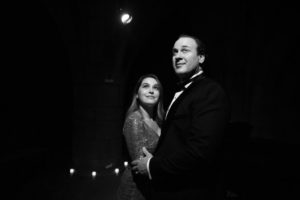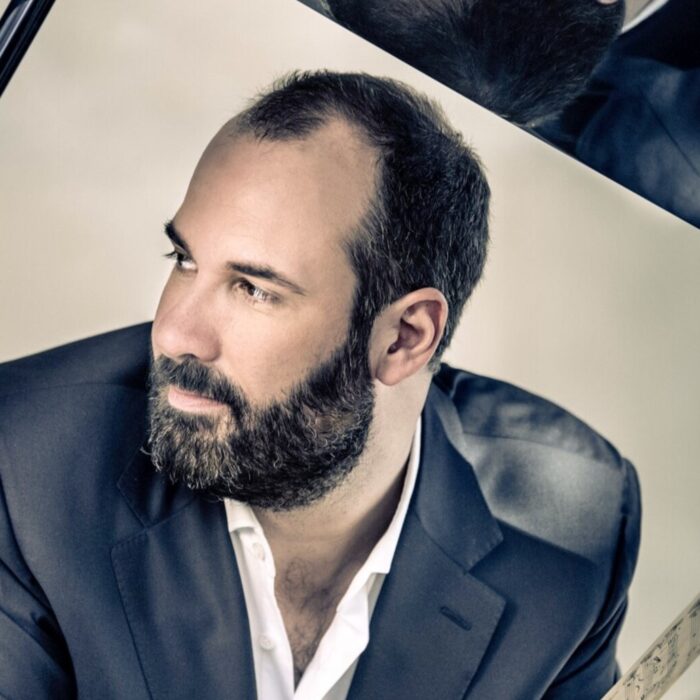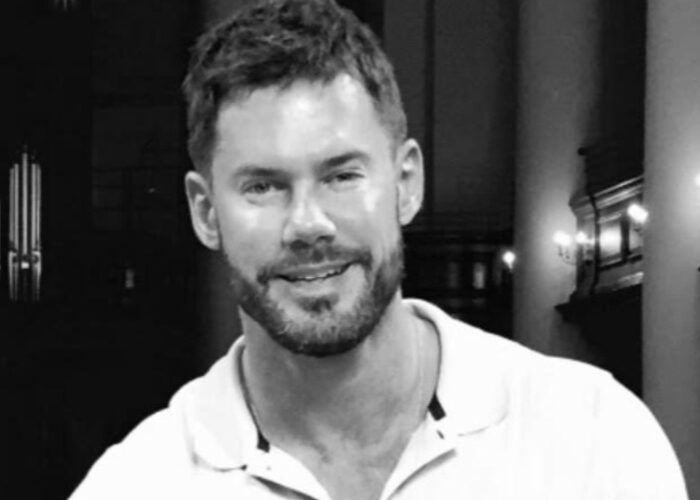
Q & A: Lucas & Irina Meachem on Co-Founding Perfect Day Music Foundation & Its Inaugural Virtual Voice Competition
By Chris RuelGrammy® Award-winning baritone Lucas Meachem and his wife, pianist, Irina, saw injustice up close this past summer. While many of us watched the aftermath of George Floyd’s death on television, the Meachem’s are Minneapolis residents.
As calls for racial justice grew, and opera companies began taking stock of their own diversity, equity, and inclusivity, the Meachem’s knew they had a role to play in bringing fairness to underrepresented communities within classical music. Little else frustrates Lucas more in life than an uneven playing field, so for the couple to sit back and do nothing wasn’t an option.
Raising the voices of underrepresented artists and foregrounding works by composers relegated to history because of the color of their skin or gender is at the core of the Meachems’ newly born Perfect Day Music Foundation, an endeavor that has brought the two musicians an infinite amount of joy and satisfaction in the short time since its founding in the summer of 2020. Our conversation over Zoom was beautifully lit by the smiles on the Meachems’ faces.
The Foundation is about giving back. Both Lucas and Irina received much from others when they were young in their careers. Irina is a first-generation Romanian-American, and Lucas grew up in a large family in which they needed little but also had little. Yet the spirit of giving goes beyond the Meachems’ personal experiences. The couple is literally putting their money where their mouths are and walking the talk for bringing equity and fairness into the classical music industry in ways that haven’t been done before, and the first item on the Perfect Day agenda was the creation of a vocal competition that reflected their ideals and did so uniquely.
The inaugural competition centered on African-American representation in art song and operatic aria blew the Meachems’ expectations out of the water. The Meachems thought maybe they’d get 10 or so entries, but entry after entry kept rolling in, and during the final 24 hours before the application window closed over 30 more came in, bringing the total well over 100. The entire competition took place online, with Irina running the social media accounts, responding to emails from entries, and reviewing the videos sent in by the participants.
Meanwhile, Lucas pulled the Board and the panel of judges together. The panel comprised a who’s-who of opera’s heavy-hitters: Angel Blue, Lawrence Brownlee, David Lomelí, and John Holiday.
To impress such a prestigious panel, participants needed to bring their A-game, and they did. The Meachems had nothing but praise regarding the entrants’ videotaped performances, but only two could emerge as winners, and they were Chicago-native Jacqueline Piccolino who sang “Serenity Prayer” by Jerrell Gray, and Blake Denson, a baritone from Kentucky, who performed “Steal Away,” a traditional spiritual arranged by Shawn E. Okpebholo. Each won $1000 in prize money.
Prior to announcing the winners via Zoom—a ceremony hosted by Kenneth Overton—Lucas spoke eloquently and unequivocally about Perfect Day’s mission, and by extension, the Meachems’ own.
“For me, the pursuit of singing my best has been a long journey, and I always believed that if I can become the best singer, then I would be rewarded with the best opportunities. This not really representational of real-life and all artists. We understand this aspect of the arts. However, to be excluded from even the consideration of having your work counted as worthy based on race gender or sexual preference is both archaic and unacceptable,” he said. “This is our fight. The goal of this Foundation is to put as much historically underrepresented music out into the world as possible. We are fortunate to be living in a time where we’ve been given the best medium with which to accomplish that—the Internet.”
Then, there was this: “We are moving forward to the realization of these lofty but most necessary of goals. Historically underrepresented is a kind way of saying excluded, ostracized, kept out, prohibited. We stand here today in solidarity and say that the words we’re going to strive for, that we expect, nay, that we require are inclusivity, acceptance, togetherness, and a normalization of the new normal where Franz Schubert and William Grant Still are judged on the merit of their composition, not the color of their skin; where Gabriel Fauré and Florence Price are judged not by their gender but by their talents; and where singing a song by a composer of African descent becomes the new normal in our standardized repertoire.”
OperaWire spoke with the Meachems about all the above, and more in this interview about giving back and effecting change in classical music.
OperaWire: Walk me through the founding of Perfect Day from ideation to the first annual competition.
Irina Meachem: A few years ago, we had a longing to do something that was above simply performing, but didn’t know what. It’s very difficult when there’s a desire to do something and you don’t know how to do it or if you have the resources. We felt frustrated because we didn’t know what we could do as a singer and a pianist.
A lot of things have changed this past year. The industry has realized some of the issues involving underrepresentation. We saw things happening around us, and that people wanted to be part of the change. So, Lucas and I put our heads together and had some great conversations with people in the industry. We decided that a competition that was so unique in the industry would do some of the things that we wanted.
The big thing for us is changing the repertoire because there are so many highly deserving pieces of music that ought to be standards. When we began exploring, we heard pieces like “Night” by Florence Price and wondered why it wasn’t at the forefront because it’s so moving, it’s great at every level of singing, and the historical importance is very high. It was this type of repertoire we wanted to gather. Let’s get people performing it, let’s get people hearing it, and let’s get it out on the virtual landscape of classical music. And so, our idea about how to get the music out there was through the competition.
OW: Lucas, do you have anything to add?
Lucas Meachem: In order for me to even have achieved as much as I have in this career, I had to begin somewhere and to begin, I needed scholarships; I needed competition money to pay for books. I was given so many opportunities by other foundations that provided prize money, gifts, and scholarships that I wouldn’t be where I am without the help of other people. I wanted to make sure that we were trying to support people as much as possible, and during COVID, suddenly a $1,000 first prize is a big number. Just like Irina said, we wanted to not only change what is considered standard in the repertoire but also to put money in the hands of young singers because it’s a tough time right now.
OW: Can you tell me about the roles that you each play as cofounders? What’s the division of labor?
IM: I did all the organization. I was constantly writing emails to all the participants. I reviewed every video to make sure it complied. I did have an assistant who helped compile all the information, but otherwise, I was the contact for everybody. It was a full-time job when the videos were coming in right before the deadline. I do all the social media posts and then we created a website. That was an enormous artistic undertaking to represent fully what we wanted.
LM: One of the biggest problems is that because the repertoire isn’t heard, it’s not repeated, and that makes it difficult to find. So, we’ve created a resources page on the website for locating music by historically underrepresented composers.
I want to add that Irina was also the editor for all the videos. For every round of competition, she put them together while I put the board and the judges together. The fundraising falls in my lap and we do that through word of mouth. We’ve done some concerts to raise money, as well.
IM: And we’re donating our own money, too.
OW: How did you land on a name for the Foundation? I know it comes from the Carrie Jacobs-Bond song, “End of a Perfect Day.”
IM: We were exploring repertoire and came across this amazing jewel of a piece that was written by a female composer and was a hit at its time. We decided we had to have it as part of our mission because it’s all about coming together, and I think one of the toughest issues we face today is connection and coming together. We really feel the song captures that emotion, and her name is not as widely known as it once was.
OW: How did you go about promoting the competition?
IM: Social media; it’s all directly on social media. We also use YAP Tracker. It’s a great bridge between competitions, young artist programs, and young artists.
LM: We had a lot of help getting the word out through our judging panel. The judges we chose are all dear friends of mine, and they have a lot of reach.
IM: In the end, we had over 130 applicants, which we thought was a great number for the first time. We didn’t know what to expect—maybe 10 people? The participants were so thankful because we corresponded with them directly. The messages we received were something I didn’t expect. They were so proud to be part of something like this and so happy to take part because they felt like they were creating change, as well.
OW: Reaching out through email to the singers is a very personal touch.
IM: I respect what they do so much, and they shared their talent with us. Since there is that personal touch, it’s not just another competition.
All the finalists got to meet the judges virtually, and we had this amazing session where they all gave their feedback and the participants were so appreciative. It went better than I could have ever imagined. It was really a perfect day.
OW: How else is the Perfect Day competition different?
LM: We did not charge an application fee because we don’t believe in using singers as a resource for profits. We rely on donations from other people who were so gracious, and we’re so thankful for that because we can truly look the artists at for their singing capability and for their talent, not for their financial resources. I remember when I was younger and paying audition fees would almost kill me. I was sleeping on couches in New York City. It’s all through personal experience that we’ve figured out a way to oversee the ideas of enabling young artists and young singers to be a part of the competition.
We knew we would put money in the pockets of young students, and we knew we would highlight historically underrepresented composers and pieces, but what we didn’t realize was that we would give these young singers an opportunity to get dressed and do an audition. We didn’t even think about that. They said it’s so nice to go out there and search for pieces, to prepare, to think about the language, the poetry and then get dressed up, do your hair, do your makeup, put yourself in front of a camera and sing an audition with a pianist either live or virtually. People were thanking us for that opportunity because we were pretty hardcore in the middle of the pandemic when they were recording their songs.
LM: We also offered feedback on every audition we received. Receiving feedback is a problem that a lot of singers express; they submit something, and they hear nothing back and don’t know why their entry didn’t make it. Lucas and I wrote them three or four sentences—two things they did well and one thing to improve on.
OW: You have two tiers, the Collegiate, and the Emerging. How did you decide upon those two segments?
IM: That was a committee decision made with the judges and the other members of the committee. We’re fortunate to have the resources to give two awards, so it’s about distributing chances over a fair landscape for participants.
In the Emerging category, all the finalists received a free application to the Paris Opera Competition as an additional prize, and every finalist received a free voice lesson on the app Resonance. Those were donations given by those two institutions.
LM: It was so generous of them to do that. We’ve been working closely with the people who developed the Resonance app, and we just mentioned it to them. They were like, “Of course, how can we help?” It was the same thing with the Paris Opera Competition.
OW: Let’s talk about the star power on the panel. How did you bring such a prestigious group together?
IM: The only way this would have worked was to have a high-profile judging panel. That was the key element.
LM: The most nerve-wracking part of this competition were my phone calls to make that ask because I ask little of my friends other than, “Hey, let’s have some dinner after the show.”
IM: And none of them hesitated.
LM: I felt like I was giving them the hard sell; “It’s a really great cause and we really want to do this…” In the end, they were like, “Of course, Lucas. You need me. I’ll be there.” I was so moved because of how quickly they said yes, and that made me feel great about not only our goals but also our friendship.
OW: What drives your passion to raise up underserved communities.
LM: I’ll start by saying that fairness to me is the most important thing. It’s the one thing that frustrates me the most in life. When I see something unfair, even if it’s not affecting me personally, it’s just as much my responsibility as it is anyone else’s to try and create an aura of fairness—where what’s truly considered is not the color of one’s skin, the weight they carry, or their sexual orientation but their love of the art, their talent, and their personhood.
IM: When I have an opportunity to share music that is extremely moving, and is so personal, such as Romanian music, I make an effort to program it on recitals. Honestly, I’ve felt like I have neglected female composers in my selection of repertoire. So, I’m here to admit that I want to open up those possibilities for myself as a pianist. While I consider myself a feminist, I see that my repertoire choices don’t reflect that. That being said, we really wanted to have this be also an announcement of our second competition and share the new theme which is women composers. It’s a vast array of repertoire that has been overlooked. We want to encourage singers to perform this repertoire. Men are a big part of this; it’s not just women’s music for women.
LM: It’s for everyone to be a part of and the more we open that door, it’s just going to get kicked down really, really soon.
OW: Was it a concern of yours that some within underserved communities may not have the technology needed to take part in the competition?
IM: Yes, and we made it clear with the judges that at no point should the video production reflect the decision on advancement. The winner, Blake Denson, used his iPhone in portrait mode, but it was all about the quality of the singing, their performance, and their vocal capabilities. But there were other videos where the setup was very elaborate, but we made vocal capability foremost over any production quality.
LM: I was on the phone with the judges during their deliberations, a fly on the wall. I said, “You guys talk amongst yourselves.” But the main thing they kept coming back to was that the semifinalists were great singers.
OW: What’s the biggest takeaway that you have come away with? Speaking with you, I can see there’s a lot of satisfaction. I see the smiles and the joy you have about the Foundation and the competition, but what have you taken away personally?
IM: It’s a great question because I had not anticipated having such personal gain from the private correspondence with all the singers. It was really meaningful and special for me, and there was such a deep tone of respect both ways.
It was very fulfilling for me to hear from all types of singers. Again, this is a very personal thing. We’re traveling constantly; Lucas is singing on the big stages of opera and we feel very disconnected from the younger singers.
As we’re getting older and we see the competition’s happening, and the young artists being announced, we don’t recognize any of them. I used to know half of the people on those lists and, now; we feel somewhat isolated from the younger singers and sometimes out of touch. Personally, I’ve listened to really amazing top-quality performances. I recognize the names and I’ve gotten to know them.
LM: I didn’t think I would find another job in my life that would not seem like a job. I’m the luckiest guy in the world. I get to make music for a living. I’m a professional opera singer and every time I rehearse and step on stage, I love every moment.
As I’ve been working on this competition, it’s been a ton of work, but it’s that old saying, “If you do what you love, you’ll never work a day in your life” and I didn’t know there was something else out there for me to put a lot of hours into something so rewarding.



